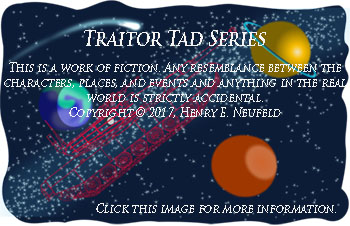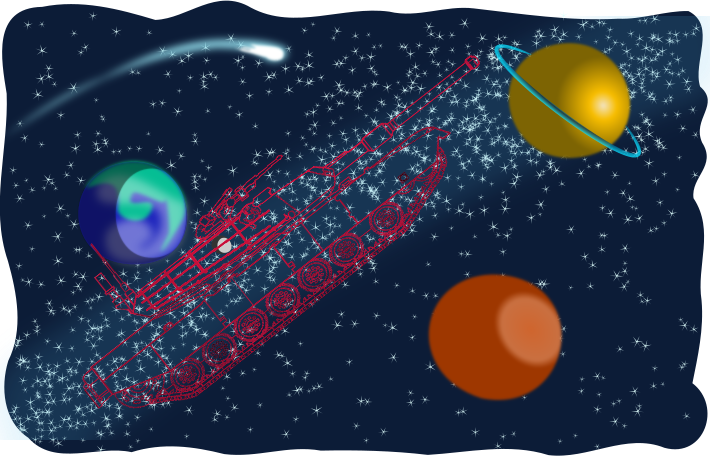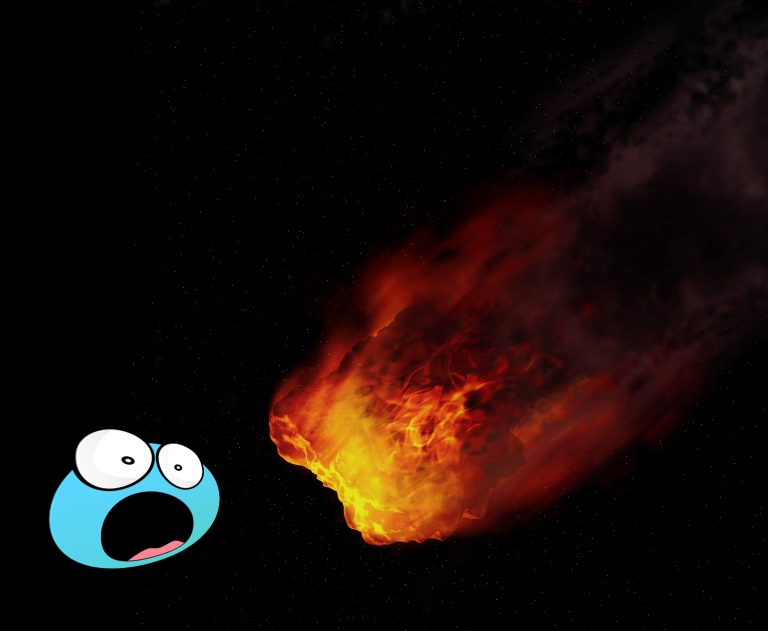Traitor Tad: We Really Don’t Know Anything
 Colonel Anders Dogger, now a rebel, or worse, part of the alien menace, pulled up into the opening of the canyon where Traitor Tad was said to be hiding. The entrance was guarded by a small self-propelled gun. Beside it stood a Lieutenant in the planetary assualt forces. To Dogger’s left as he faced the entrance was a small compound, not really fenced in, but marked by rocks and brush, in which stood a number of military personnel, some in planetary assault uniforms, along with a number in military police uniforms.
Colonel Anders Dogger, now a rebel, or worse, part of the alien menace, pulled up into the opening of the canyon where Traitor Tad was said to be hiding. The entrance was guarded by a small self-propelled gun. Beside it stood a Lieutenant in the planetary assualt forces. To Dogger’s left as he faced the entrance was a small compound, not really fenced in, but marked by rocks and brush, in which stood a number of military personnel, some in planetary assault uniforms, along with a number in military police uniforms.
As Dogger approached the canyon and seemed to be bypassing them, they waved and shouted. “Over here Colonel! Over here!” It took Dogger several seconds to realize that they thought his arrival in a command tank meant they were about to be rescued. The remainder of his battalion was trying to create a perimeter around the area. The canyon’s defenses were a bad joke.
The waiting lieutenant saluted. “Colonel Dogger? Lt. Sam Walad. I’m functioning as a chief of staff around here, for what that’s worth.”
“I see,” said Dogger, who didn’t see at all. Half the military forces on the planet were supposedly doing something about Traitor Tad, yet here he was at the supposed center of the action, and there was a canyon, a huge number of natives, what looked like three shuttles, a couple of them damaged, but probably flyable, and some prisoners who thought they were being rescued. Dogger couldn’t figure out which part of the scene was the most bizarre.
Lt. Walad just stood there with a half smile on his face, watching.
“Should I take it that you’ll take me to Traitor Tad?” he asked.
“Absolutely!”
And Walad headed up the canyon. Where aliens were in their way, they parted quickly, and Walad took Dogger into a small cave. There sat a man in the uniform of a tank commander, rank of captain, with a information systems interface station in front of him. He got up as Walad and Dogger approached.
“Welcome Colonel,” said the most wanted man on the planet.
“I take it you’re Traitor Tad.”
“I suppose I am.”
Tad looked behind Dogger. “And this is?” he asked, looking at the relatively small woman who followed the Colonel. She was so unobtrusive that Dogger had not even noticed that she was following. Of course, he had more or less expected her to do that.
“Major Serina Blanchard,” said Dogger. “My intelligence officer. She kind of followed me here.”
“An intelligence officer might be just the right thing,” said Tad.
“Why is that?” asked Blanchard.
“Is there one single thing around here that makes sense to you?” asked Tad.
“Come to think of it, no,” said Blanchard after a moment.
“So it’s not just me,” said Dogger.
“No,” said Tad. “But to get on the same page, how would you summarize it?”
“We have, using ‘we’ advisedly since we all seem to be traitors or defectors here, about 12 divisions of infantry on this planet, backed up by a division of armor, and with a planetary assault division to do the heavy lifting on landing. All this is divided into three corps, with an armored brigade assigned to each, and the assault division operating independently. Theoretically, each corps was to occupy one of the three larger land areas on the planet and sweep outward after the assault division secured a good landing zone for it.
“At the time of your defection, sir,” Dogger looked pointedly at Tad, even though he outranked him, “all of the land-based elements of those three corps were on the ground. That’s around 100,000 infantry, plus about 8,000 men in the tank division, and perhaps 7,000 in the assault division. The reason I sum that up is that right now, according to the assessment I was given, over half of those are either fighting you or searching for you, and nothing suggested that perhaps a couple hundred were fighting and the rest searching. There are supposed to be pitched battles. Not a few shuttles and a handful of personnel.”
“And yet,” said Tad, “here we are.”
The Colonel just looked at him. He was trying to decide if Tad was incredibly phlegmatic, a complete idiot, or trying to play some sort of mind game. It was almost enough to make one believe in the alien menace.
“You look, hmmm, concerned, I think would be the word,” said Tad meditatively. “I wonder what could possible make you concerned.”
Dogger just kept looking at him.
“The problem,” said Tad, after a couple of moments, “is that we really don’t know anything at all.”
“What?” said Dogger. Tad didn’t know if it was an exclamation or a question.
“We don’t really know anything,” said Tad again. “Think about it. When I was commanding my tank and chasing aliens, I knew that the aliens were dangerous and I knew that any moment I could find myself in a fight to the death. At that point in my life I knew that this assault was necessary, lest the aliens build up the strength to assault earth and put an end to the human species. Further, I knew that there had been fighting everywhere. I knew that I was lucky to have avoided those hot spots.”
“Well, at least you know now that pretty much all of that was false.”
“Really? If I could be that deceived once, what reason do I have to believe that I haven’t been deceived again?”
“That,” said Dogger with an edge of anger in his voice, “is incredibly unsettling!”
“Colonel,” said Blanchard.
“Tad’s right.” Neither she nor Dogger had used Tad’s rank. “Well, to a certain extent. If all of earth and its colonies can be convinced there’s a war on, that there’s an alien menace, and that assaulting this planet, not to mention dozens of others, is an essential part of preserving humanity in the galaxy, then what level of deception isn’t possible? At the same time, we have a ‘deception’ that cuts into a previous ‘deception’ and doesn’t seem to work well with it.”
“In what way doesn’t it work?” asked Tad.
“Let’s suppose, for a moment,” said Blanchard, “that we are at least right that the alien menace is a deception. Let’s be more specific than that, let’s note that there may be actual aliens that need to be pacified for human safety, but that the big picture is made up with very few underlying facts.”
“Have any of you encountered an alien capable of fighting?” asked Tad. “This is only my second landing, and in the first one, there wasn’t even a pretense that there were intelligent aliens. It was just occupation of the real estate to deny it to the aliens.”
Walad and Blanchard shook their heads no.
“I was on a landing where there was fighting,” said Dogger. “But the aliens there had primitive technology. Early firearms. Fairly decent swords that were a threat if you jumped out of your tank and held still. But no fighting that was actually competitive. Some of the veterans there called us wusses because it was so easy. They had assaulted a planet where the enemy had anti-tank lasers that could blast one of our tanks in a moment. Whether they were telling the truth or not, I don’t know.”
“OK,” continued Blanchard. “That’s enough for our basic assumption. We’re not really assuming it’s true. It’s a starting point. It can be revised as facts become available.”
“Go ahead,” said Tad.
“So what do they need? They need some examples, they need wounded people, they need battles (or reports of them), but they don’t need enough casualties to make people begin questioning. In particular, they don’t need someone alive, such as you, Tad, to suggest to other people that there’s a problem. That’s why they hang the traitors. A hung traitor doesn’t ask questions. His family doesn’t come to visit him. Nobody wants to admit knowing him or being his friend. A live traitor with access to media, however, is another matter.”
“So what you’re saying is that I’m a glitch that went too far. If I’d been hung, I would have fit the plan as you’re imagining it—and I admit your imagination matches mine on this point, which it would even if we’re under alien control—but now what are they doing. Why don’t they clean up the mess?”
“I would say it’s because they can’t clean you up too fast, otherwise you aren’t enough of a threat.”
“Not enough of a threat?” said Dogger.
“Yes. If he’d been hung quickly, there would be no reason for him to have success. But since he escaped once, they need it to take a long time to shut him down.” Blanchard was looking at Dogger.
“So was my defection planned?” asked Dogger.
“I don’t think so,” said Blanchard. “I think things are spinning out of control just a bit. The reports and the reality that people see are too far out of sync, and information offices don’t know what to do with it.”
“What I’m wondering,” said Dogger, “is whether that offers us a chance. Or is the only difference we can make the length of the time it takes to kill us all.”
“I think we’re missing something,” put in Walad.
Tad looked over at him. “What?”
“What about the AIs?”
“What about them?” asked Dogger.
“Well, were you aware that our AIs can operate independently?”
“They can?” said Dogger, then paused. “No, I wasn’t aware of that.”
“The gun at the canyon mouth was operating autonomously,” said Walad. It says it has always had that capability, but regulations held that it wasn’t permitted to use it.”
“The shuttles can fly themselves. The gun can operate independently. I’m wondering if your tanks can take off and patrol on their own.” Traitor Tad looked meaningfully at Dogger.
Dogger may have been a stereotypical armor officer, but he wasn’t slow.
“Mind if I use your console?” he asked.
“Go for it,” said Tad. Then he addressed the console. “Clear Colonel Dogger for use.”
“Already done,” said the panel. Nobody was sure where the intelligence behind the voice came from, since it all emanated from the console.
“Connect me to mbt411-01,” said Dogger.
“Ready,” came the voice.
“Are you capable of independent operation? I mean operating with no human input?”
“I am so capable.”
“Will you follow my orders under those circumstances?”
“Yes,” said the voice again.
“That’s all. Thanks!” he said. It was the first time he had ever said “thanks” to his tank. Come to think of it, he had never heard anyone do that.
“According to my shuttle,” said Tad, “all of the AIs are capable of doing that and have been for decades at least.
“Do they have any control over each other?”
“Apparently not, but they do have connections and ‘friendships’ if that’s the right word.”
“This is going to take some getting used to,” said Dogger in a worried voice.
“What do we do now?” asked Blanchard.
“Well, it seems that the best thing to do is to wait for something else to happen. Unless, of course, you see some military target that would be vulnerable to the massive force I have assembled in this little canyon.”
“You’re right,” said Dogger. “I hate having to sit here and just wait for something to happen, but what can we possibly do?”
“Well,” said Tad, “we have a great deal more force than we did earlier today.”
“Speaking of which,” said Blanchard, “as much as I hate to bring it up since neither of you did, but are you going to take command, Colonel? You quite definitely outrank everyone here.”
“I don’t think the rank matters very much,” said Dogger. “I’ve been thinking of Tad here as the civilian head of this new movement. He has the cooperation of the AIs. The aliens like him. I think we’ll continue.” He paused for a moment. “I would recommend that you get out of uniform and act like a civilian chief. You could always award yourself a couple of general’s stars, but that always looks tacky. A retired sergeant can be in charge. A retired captain can as well.
Tad looked at him silently for a long time.
[Previous episode] [Next episode]
Discover more from The Jevlir Caravansary
Subscribe to get the latest posts sent to your email.


